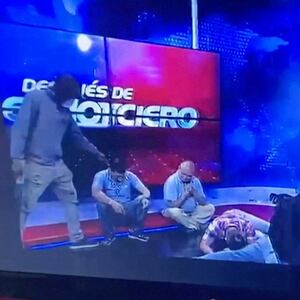Adolfo “Fito” Macías, Ecuador’s “most notorious criminal” and leader of the powerful Los Choneros drug cartel, vanished Sunday from his prison cell—just hours before he was slated to be transferred to a high-security facility.
Macías’ disappearance and ensuing violence from his men has thrown Ecuador, which has been plagued by kidnappings and gang violence in recent years, into chaos that its president has described as full-out “war.”
Macías, who assumed power of the Los Choneros cartel after its previous leader was murdered in 2020, was scheduled to be transported to a max-security prison Sunday where his men held no control. But, with eyes and ears scattered throughout the Ecuadorian government and national police, authorities say he was tipped off to the scheduled move and evaded authorities and has been missing ever since.
The 44-year-old Macías has epitomized Ecuador’s recent struggles with the cartel. John Henry Murdy, a University of Chicago PhD student studying gangs and prisons in the country, told The Daily Beast that Macías seamlessly ran his cartel from behind bars using smuggled cell phones, and was being protected by his fellow prisoners who were armed with assault rifles.
The Guayaquil facility where Macías was incarcerated, like others in Ecuador controlled by cartels, wasn’t much of a prison by the time of his escape. While there, Macías infamously constructed a pool, snuck in his girlfriend for a week (successfully lobbying for her release when she was arrested), and even welcomed in cameras to be featured in a professional music video for a song sung by his daughter and Mexican musicians about him.
In that music video, and in other recent images of the kingpin, Macías appeared to be overweight—another sign Ecuador’s most notorious criminal, who’s reportedly believed to be behind the assassination of the anti-cartel presidential candidate Fernando Villavicencio last year, wasn’t receiving the traditional prison experience.
Now seemingly free (Ecuadorian authorities haven’t ruled out that he’s still hiding somewhere in the Guayaquil prison), Macías’ men have thrusted Ecuador into a military state, with a decree being issued Tuesday that has Ecuador essentially under martial law, Murdy said.
Photos by local media have show soldiers taking over the downtowns of its largest two cities, Quito and Guayaquil, and trying to do the same at its prisons, where riots have broken out. The country of 18 million now has an indefinite curfew between 11 p.m. and 5 a.m.
Ecuador’s national police said Wednesday that more than 100 prison guards and staff were being held hostage and that more than three dozen prisoners had escaped custody. They added that two police officers were killed in the Guayas province, which is home to Guayaquil, and that seven others had been kidnapped.

People walk past the remains of a public bus that was set on fire in Guayaquil, Ecuador’s largest city.
Reuters/Vicente Gaibor del PinoPublic buses have been burned this week and a pedestrian bridge was damaged by an explosion, but perhaps the most attention-grabbing act of violence came when nearly a dozen cartel members rushed the studio of TC Television as it was in the middle of a live broadcast on Tuesday afternoon.
Those men held journalists at gunpoint and forced them on the ground, while screams and gunshots could be heard in the background. Nobody was killed in the stunt, but a cameraman was shot in the leg and hospitalized, according to Jorge Rendon, deputy director of the news program that was interrupted.
“Thank God we are alive, because it was an extremely violent attack,” he said Tuesday.
Benjamin Lessing, a University of Chicago professor who specializes in organized crime, told The Daily Beast Wednesday that public demonstrations by the cartels are an act of “violent lobbying”—acts carried out to send a message to those in power. In this instance, the person in power is President Daniel Noboa, who has spoken against the cartels and has publicly suggested Ecuador lift its ban on extradition.
Citing similar acts of “violent lobbying” by Brazilian cartels, Lessing warned against Ecuador’s military meeting the cartel’s violent acts with force of their own, saying history suggests it’ll only strengthen the criminal groups.
Murdy said Macías and his men operate in cocaine and other organized crime, amassing their millions by moving drugs and carrying out for-profit kidnappings that force citizens to drain their savings at ATMs to buy back their freedom.

Soldiers in an armored vehicle patrol the the historic center of Quito, Ecuador.
Reuters/Karen ToroWhile Los Choneros’ operations sound eerily similar to that of Mexican and Colombian cartels of the 1980s and ’90s, Ecuador’s modern-day cartel operations are much smaller and operate differently. That’s largely because Ecuador’s criminal organizations, of which there are dozens, often are involved in transporting drugs more than they produce them.
Ecuador has becoming an increasingly important stop for drug traffickers from South America with Colombia cracking down hard on its own cartels in recent years, said Ernesto Castañeda, Ph.D., the director of the Center for Latin American and Latino Studies at American University, in an email to The Daily Beast.
“The shipping has shifted partly to Ecuador, but they depend on transnational networks and groups outside of Ecuador to buy and sell,” he said.
Among the transnational groups associated with Los Choneros is the infamous Sinaloa cartel in Mexico, said Jaime Lopez-Aranda, a security expert for International SOS. That cartel operates in the birthplace of Joaquín “El Chapo” Guzmán, which, like Ecuador, has ports on the Pacific Coast.
Lopez-Aranda said he’s been in contact with people on the ground in Ecuador, and has helped some leave the country. He added that he’s helping facilitate an emergency plan to evacuate others if violence ramps up in urban areas—something that’s not out of the realm of possibility with Macías, who he called Ecuador’s “public enemy No. 1,” now back on the streets with an entire army searching for him.







